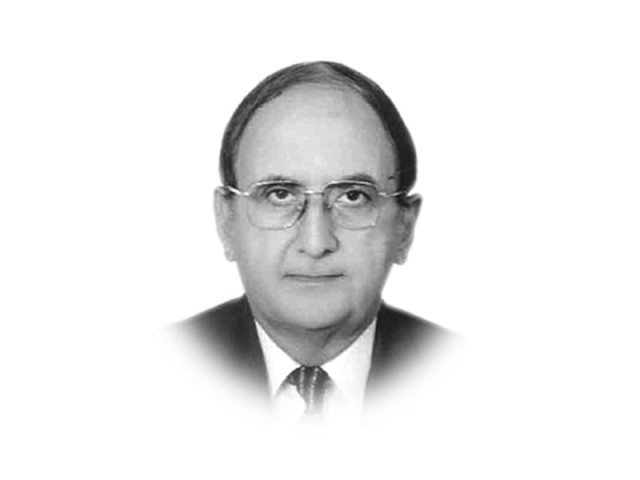The NSC bounces back
The top civilian leaders and the military high command need to develop a shared view on terrorism.

The writer is an independent political and defence analyst. He is also the author of several books, monographs and articles on Pakistan and South Asian Affairs
The federal government will have to issue an executive order or pass a new law to replace the old NSC with the CCNS. However, the federal government has attempted to control the political fallout of reviving the NSC under a new name and described it as the reconstituted cabinet committee. If it was simply a reconstitution of the DCC, there was no need to rename it because the DCC used to invite all those who have now been made members of the CCNS. The DCC could continue because this concept was more in line with the democratic process.
It seems that the federal government has proposed the use of the words ‘cabinet committee’ in the title of the new body to argue that it is simply an updating of the DCC. There appear to be three major reasons that the PML-N government wants to hang on to using the words ‘cabinet committee’.
First, the PML-N, like the PPP, was opposed to setting up the NSC going back to the time when the civilianised military government of former president General (retd) Pervez Musharraf wanted to establish a NSC in 2003-2004. Despite the opposition of these political parties, parliament passed a law in April 2004. The opposition parties, including the PML-N and the PPP, protested and staged a walkout in both, the National Assembly and the senate, when the NSC bill was passed by the PML-Q and its allies. The PPP government kept the NSC dormant during 2008-2013, although the law was done away with.
The PML-N is expected to argue that the proposed CCNS is different from the one established during the Musharraf era and that it is more democratic and in line with current needs.
Second, the military top command was not keen about the DCC as the highest policy review and policymaking body on defence and security affairs because the top brass of the military could not be its regular members, as it was not part of the federal cabinet. Its participation in the DCC was described as being in ‘attendance’, along with the top-most intelligence officers and senior bureaucrats who participated on ‘invitation’. Musharraf’s NSC and the proposed CCNS give the top brass a status equal to the civilian members.
Third, the structure of the NSC set up during the Musharraf rule had unwieldy membership that excluded key cabinet members. Although the key cabinet members attended the NSC meetings, they were not formal members. The proposed CCNS includes those cabinet members and excludes others who were included for the first time in 2004.
Traditionally, the military top brass has been keen to establish the NSC in the post-military rule phase, which provides a legal and constitutional cover to the role of the military in national security affairs — in expanded mode, this includes issues of related civilian policy domains.
If we examine NSC-type institutions in other countries, one fact appears reasonably conspicuous: the role of the top brass of the military is somewhat restrained when it comes to the final level. However, in ex-military ruled states, their presence at the highest level is integral to the system.
Perhaps, one can argue that in Pakistan, the defence and security affairs, including the key foreign policy areas, were the preserve of the military and the ISI during the years of direct and civilianised military rule. The Foreign Office used to contribute to this process but it was mainly doing the implementation task.
The situation changed somewhat during 2008-2013, when the decision-making in the above-mentioned domains was done through a civilian-military consultative process. This also includes the meetings between the service chiefs, especially the army chief, and the prime minister and the president. The role of the Foreign Office has also improved. Much depends on the intellectual and professional calibre of the foreign minister and his/her capacity to maintain a relationship of confidence with the military and intelligence top command.
The proposed CCNS institutionalises the ground realities of policymaking in Pakistan. It can strengthen and deepen the consultative process, provided the CCNS functions regularly and the civilians take up security and defence affairs in a more professional manner.
The CCNS should meet on a regular basis rather than in an emergency situation only. It needs to meet once a month, or more, if required. An office of a ‘civilian’ National Security Adviser (NSA) should be established on a regular basis that should also look after the CCNS secretariat, directly under the prime minister. There must be a regular research support system under the NSA that provides insights into defence along with internal and external security. The NSA should maintain a link with the research centres/think tanks, the academia and others who work on these affairs.
The top civilian leaders and the military high command need to develop a shared view on terrorism, its sources and how to tackle it, by military and non-military means.
The dual track policies on these issues pursued both by civilian leaders and the military are the major obstacles to tackling religious extremism and terrorism. The civilian leaders are often handicapped by their partisan political considerations of winning votes. The military cannot get over its straightjacketed tunnel view that continues to create space for selective militant groups.
The civilian and military authorities should demonstrate a unity of mind and determination to counter, non-discriminately, all those building weaponised enclaves for themselves at the expense of the Pakistani state and society.
Published in The Express Tribune, August 26th, 2013.
Like Opinion & Editorial on Facebook, follow @ETOpEd on Twitter to receive all updates on all our daily pieces.















COMMENTS
Comments are moderated and generally will be posted if they are on-topic and not abusive.
For more information, please see our Comments FAQ